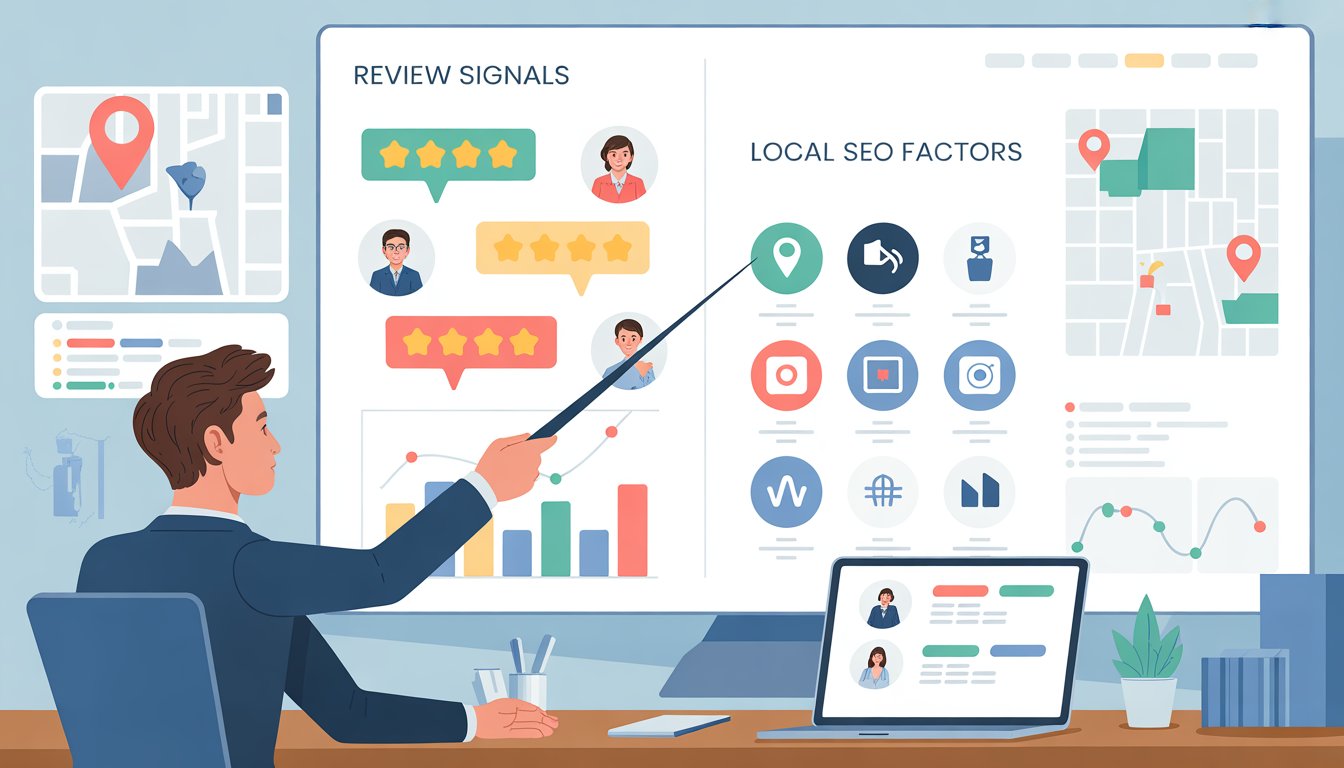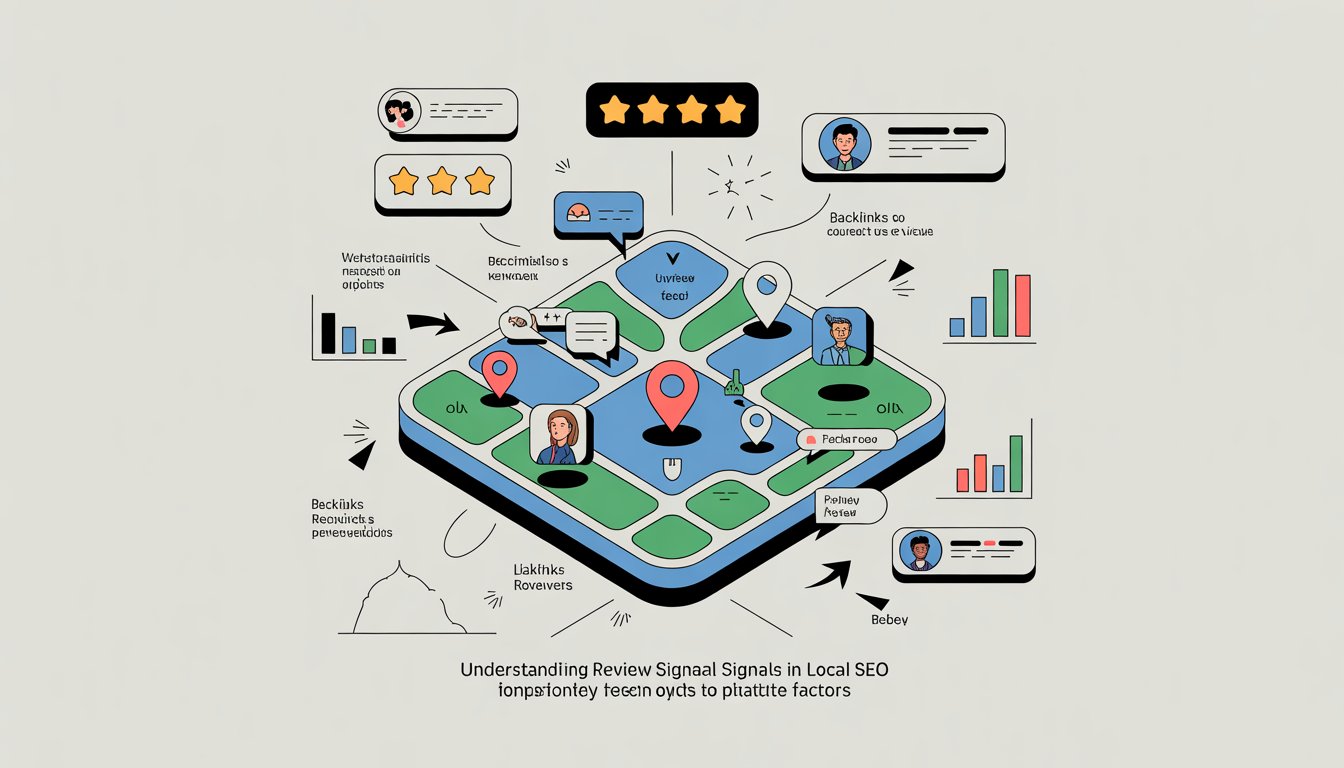Local businesses face a complex web of ranking factors when trying to appear in Google's local search results. While traditional elements like citations, backlinks, and on-page content have long dominated local SEO strategies, review signals have emerged as one of the most powerful forces in determining local search visibility.

Review signals now rank among the top local SEO factors, competing directly with business profile optimization and citation accuracy for influence over your local rankings. Google uses three main criteria to evaluate local businesses: relevance, proximity, and prominence.
Review signals play a crucial role in demonstrating prominence and can significantly amplify the effectiveness of your other local SEO efforts. Understanding how review signals stack up against other ranking factors helps you allocate your time and resources more effectively.
The relationship between reviews and elements like your Google Business Profile, local content, and backlinks creates opportunities to build a stronger overall local SEO strategy that drives real results for your business.
Key Takeaways
- Review signals compete with business profiles and citations as top-tier local ranking factors
- Reviews work best when combined with optimized local content and accurate business information
- Local search visibility requires balancing review management with traditional SEO elements like relevance and proximity
Core Local SEO Ranking Factors

Google uses three main factors to determine local search rankings: proximity to the searcher's location, relevance to their search query, and prominence of your business. These factors work together to decide which businesses appear in the local map pack and organic search results.
Proximity and Its Influence
Proximity measures how close your business is to the searcher's location. This factor carries the most weight when someone searches for "near me" or location-specific terms.
Google determines proximity in several ways. It uses the searcher's IP address, GPS data from mobile devices, and location terms in their search query.
A coffee shop two blocks away will typically rank higher than one across town for "coffee near me." Distance doesn't always win alone.
A business further away can still outrank closer competitors if it has stronger relevance and prominence signals. This happens often in searches for specialized services.
Your business address in your Google Business Profile directly affects proximity rankings. You can't change your physical location, but you can optimize other factors to compete effectively.
Role of Relevance and Industry Type
Relevance shows how well your business matches what the searcher wants. Google looks at your business category, description, and website content to determine this match.
Your primary Google Business Profile category is the strongest relevance signal. Choose the most specific category that describes your main business function.
A "Chinese Restaurant" category works better than just "Restaurant" for relevant searches. Secondary categories help you appear for related searches.
A dental office might add "Cosmetic Dentist" and "Oral Surgeon" as secondary categories to capture more relevant traffic. Industry type affects how relevance works.
Service businesses compete differently than retail stores. Local service searches often prioritize businesses that serve the searcher's specific area, even if they're not the closest physically.
Website content relevance accounts for about 15% of local ranking factors according to research data. Include location names and service terms naturally in your content.
Overview of Map Pack and Search Results
The local map pack appears at the top of search results for location-based queries. It shows three businesses with their ratings, hours, and basic info.
Map pack rankings use different signals than organic results. Google Business Profile optimization matters more for map pack placement.
Website SEO has more influence on organic local results below the map pack. The SERP layout changes based on search intent.
"Pizza delivery" might show a map pack, while "best pizza restaurant" could display organic results with local businesses mixed in. Ranking factors have different weights for map pack versus organic results:
- Map pack: Google Business Profile signals (32%), reviews (16%), proximity
- Organic results: Website content, backlinks, on-page SEO
Mobile searches show map pack results more often than desktop searches. Over 60% of local searches happen on mobile devices, making map pack optimization critical for visibility.
Understanding Review Signals in Local SEO

Review signals are the specific data points that search engines use to evaluate your business's online reputation and determine local search rankings. These signals include review volume, star ratings, keyword content, and customer sentiment patterns that directly influence your search visibility.
Volume and Content of Reviews
The total number of reviews your business has collected serves as a primary trust indicator for search engines. More reviews typically mean higher local SEO rankings because they show active customer engagement.
Google specifically states that review quantity affects local search positions. A business with 100 reviews will usually rank higher than one with 10 reviews, assuming other factors are equal.
Key volume factors include:
- Total review count across all platforms
- Review velocity (how fast you get new reviews)
- Review recency (when your last review was posted)
Fresh reviews matter more than old ones. If your last review is from six months ago, your search visibility can drop.
The actual text content of reviews also impacts your rankings. When customers mention specific services, locations, or products in their reviews, this adds relevant context for search engines.
Review content helps search engines understand what your business does and who it serves. This improves your relevance for specific search queries.
Impact of Review Keywords
Keywords that appear naturally in your customer reviews can boost your local SEO performance. When reviewers mention specific services or location names, these terms help search engines match your business to relevant searches.
Search engines scan review text for mentions of products, services, and location details. A restaurant that gets reviews mentioning "best pizza" or "downtown location" may rank better for those terms.
Effective review keywords include:
- Specific service names
- Product categories
- Location references
- Business specialties
However, you should never try to force keywords into reviews or ask customers to use specific words. Search engines can detect unnatural keyword patterns and may penalize your business.
The most valuable review keywords come from genuine customer experiences. Encourage honest feedback instead of trying to control the exact wording customers use.
Sentiment and Quality Considerations
Your average star rating directly affects both local SEO rankings and customer trust. Businesses with ratings above 4 stars typically perform better in local search results.
Search engines analyze the overall sentiment of your reviews, not just the star ratings. Positive language and satisfied customer experiences send stronger signals than neutral feedback.
Quality factors that matter:
- Average star rating (4+ stars preferred)
- Detailed review descriptions
- Positive sentiment language
- Reviewer credibility and history
Mixed reviews won't hurt you if the overall sentiment stays positive. A few negative reviews among many positive ones can actually increase trust by showing authenticity.
Review responses also influence quality signals. When you reply professionally to customer feedback, it shows active management and customer service focus.
This engagement can improve your local search visibility over time.
Comparing Review Signals with Other Key Factors
Review signals make up about 15.44% of local ranking factors, placing them among the most critical elements alongside proximity and business profile optimization. However, their importance varies significantly by industry and location-specific factors.
Reviews Versus Proximity
Proximity remains one of Google's strongest ranking signals for local searches. Your business location relative to the search center often outweighs review quality.
A business with 3-star reviews located downtown will typically rank higher than a 5-star business in the suburbs for city-center searches. Proximity of address to centroid has increased as a ranking factor in recent studies.
Review signals can help bridge proximity gaps in competitive markets. Businesses with strong review profiles (4+ stars, frequent fresh reviews) can compete with closer competitors.
The combination works best when both factors align. High-quality reviews near the search location create the strongest ranking advantage for local pack placement.
Reviews and Business Profile Optimization
Google Business Profile optimization competes directly with review signals for ranking influence. Both factors work together but serve different purposes in local SEO.
Profile completeness includes accurate NAP (name, address, phone), hours, categories, and photos. These foundational elements often matter more than review quantity for new businesses.
Review signals become more influential once your profile is fully optimized. A complete business profile with strong review signals creates compound ranking benefits.
FactorNew BusinessesEstablished BusinessesProfile CompletionHigh PriorityMaintenance ModeReview SignalsMedium PriorityHigh Priority
Fresh reviews add dynamic content to static profile information. This combination signals active business engagement to Google's algorithms.
Sector-Specific Weight of Review Signals
Review signal importance varies dramatically across different business types and industries. Service-based businesses rely more heavily on reviews than location-dependent businesses.
Hospitality and restaurants see review signals carry up to 20% of ranking weight. Customers expect detailed feedback about food quality, service, and atmosphere before visiting.
Professional services like lawyers and accountants experience moderate review impact around 10-12%. Expertise and credentials often matter more than customer sentiment.
Retail locations fall in the middle range at 15-18% review signal weight. Product availability and store hours compete with review quality for customer attention.
Healthcare businesses face unique challenges where review signals carry less weight due to privacy regulations and professional standards.
Influence of Business Profiles on Rankings
Google Business Profiles serve as foundational elements that directly impact your local search visibility through specific completion requirements and strategic naming approaches. These profiles signal business legitimacy and relevance to Google's ranking algorithms.
Completeness and Accuracy of GBP
Your Google Business Profile completeness directly affects your local search rankings. Google favors businesses that provide comprehensive, accurate information across all available fields.
Essential profile elements include:
- Business name, address, and phone number (NAP)
- Operating hours and holiday schedules
- Business categories and descriptions
- Photos of your location and services
- Website URL linking to relevant pages
NAP consistency between your business profile and website is critical. Mismatched information confuses Google and hurts your search visibility.
Your website URL selection within the profile matters significantly. Linking to high-authority pages on your site boosts your profile's ranking potential compared to linking weak or irrelevant pages.
Regular updates to hours, services, and contact information maintain profile accuracy. Outdated information signals neglect to both Google and potential customers.
Keyword Branding Strategies
Your business name in Google's system can influence rankings for specific search terms. Including relevant keywords naturally in your business title may improve visibility for those phrases.
This approach works when searchers use terms that match your business name. For example, "Downtown Auto Repair" ranks better for "auto repair" searches than "Mike's Garage."
However, keyword stuffing violates Google's guidelines. Your business name should reflect your actual registered business name rather than artificial keyword combinations.
Category selection offers safer keyword targeting opportunities. Choose up to ten relevant categories that match your services exactly.
Primary category selection carries the most weight. Select the category that best represents your main business function for optimal local search results.
Optimizing for Map Pack and Local Search Visibility
Map pack rankings depend on three core factors: relevance, distance, and prominence. Search visibility metrics like click-through rates and user engagement directly influence your position in local search results.
Map Pack Ranking Mechanics
Google evaluates local businesses using three primary signals. Relevance measures how well your business matches the search query.
Distance calculates how close you are to the searcher's location. Prominence considers your overall authority and reputation.
Your Google Business Profile serves as the foundation for map pack rankings. Complete profiles with accurate NAP data, business hours, and categories perform better.
Regular updates and posts keep your profile active and engaging. Reviews play a crucial role in map pack visibility.
Both quantity and quality matter for rankings. Fresh reviews signal active customer engagement to Google's algorithm.
Local backlinks from relevant websites boost your prominence score. Links from local news sites, chambers of commerce, and industry directories carry more weight than generic backlinks.
Consistent NAP information across all online platforms strengthens your local search signals. Any discrepancies between your website, directories, and Google Business Profile can hurt your rankings.
Role of Search Visibility Metrics
Click-through rates from local search results directly impact your rankings. Higher CTRs tell Google that users find your listing relevant and valuable.
Time spent on your website after clicking from local search affects your visibility. Longer session durations indicate quality content that matches user intent.
User actions like requesting directions, calling your business, or visiting your website boost your local search performance. These behavioral signals demonstrate real customer engagement.
Mobile responsiveness influences your search visibility significantly. Most local searches happen on mobile devices, making fast loading times essential for maintaining rankings.
Your listing's performance in the local pack creates a feedback loop. Better visibility leads to more clicks, which improves future rankings in local search results.
Practical Recommendations for Maximizing Local SEO Impact
Balancing Major Ranking Factors
You need to optimize three core elements that work together for local search visibility. Proximity affects how close your business appears to searchers, but you can't change your location.
Focus on what you control instead. Build consistent NAP citations across directories to strengthen your relevance signals.
Create location-specific content that targets your service area keywords. Your Google Business Profile needs complete optimization.
Add accurate categories, business hours, and high-quality photos. Include local keywords naturally in your business description.
Review signals amplify other ranking factors when combined properly. A business with strong citations and positive reviews will outrank competitors with citations alone.
Track your local pack rankings weekly. Monitor which factors impact your positions most in your specific market and industry.
Leveraging Reviews Effectively
Reviews impact local SEO performance through quality, quantity, and recency signals. Ask for reviews consistently after positive customer interactions using direct Google review links.
Respond to every review within 48 hours. Your response rate signals active engagement to Google and shows potential customers you care about feedback.
Target semantic keywords in your review requests. Ask customers to mention specific services like "roof repair" or "emergency plumbing" instead of generic feedback.
Negative reviews need immediate professional responses. Acknowledge concerns, apologize when appropriate, and offer to resolve issues privately.
This approach minimizes damage to your local search visibility. Pair your review strategy with optimized local landing pages and consistent NAP information across all platforms.
Frequently Asked Questions
Review signals play a major role in local search rankings, often accounting for over 15% of ranking factors.
What is the role of review signals in local SEO rankings?
Review signals serve as trust indicators that Google uses to measure your business prominence. They account for approximately 15-16% of local ranking factors according to industry data.
Google views reviews as digital word-of-mouth recommendations. The search engine uses them to determine which businesses deserve higher visibility in local search results.
Your review velocity matters just as much as total review count. Getting new reviews consistently shows Google that your business stays active and popular with customers.
Review sentiment affects your rankings too. Google's AI reads review content to understand customer satisfaction levels beyond just star ratings.
How do online reviews impact local search visibility?
Online reviews directly influence your position in Google's local map pack. Businesses with more positive reviews typically rank higher than competitors with fewer reviews.
Reviews boost your click-through rates from search results. Higher star ratings and recent reviews make your listing more attractive to potential customers.
Fresh reviews signal to Google that your business operates actively. This recency factor helps maintain or improve your local search rankings over time.
Reviews also provide keyword-rich content about your services. When customers mention specific services in reviews, it helps Google understand your business relevance.
How do review signals compare to on-page SEO in affecting local search results?
Review signals typically carry more weight than on-page SEO for local rankings. Reviews account for about 15% of ranking factors while on-page signals represent a smaller portion.
On-page SEO confirms information in your Google Business Profile. Reviews validate the quality of your actual services and customer experience.
You control your on-page content completely. Review signals depend on customer actions, making them harder to influence directly.
Both factors work together to strengthen your local presence. On-page SEO establishes relevance while reviews build trust and prominence.
Why are review signals important for local businesses aiming to improve SEO?
Review signals demonstrate real customer satisfaction to search engines. Google prioritizes businesses that consistently deliver good experiences to users.
Reviews provide social proof that influences both search rankings and customer decisions. They serve dual purposes for visibility and conversion.
Authentic reviews help you compete against larger businesses. Strong review profiles can help smaller local businesses outrank bigger competitors.
Review responses show engagement and customer service quality. Responding to reviews signals active business management to both Google and potential customers.
What are the key differences between review signals and citation signals in local SEO?
Review signals focus on customer opinions and experiences. Citation signals verify basic business information like name, address, and phone number.
Citations establish your business exists and provide consistent NAP data. Reviews prove your business delivers quality service to real customers.
Citation consistency affects technical ranking factors. Review quality and quantity impact trust and prominence signals.
You can control citation accuracy across directories. Customer reviews depend on genuine experiences and voluntary feedback.
Both signals complement each other in local SEO strategies. Citations provide foundational data while reviews build reputation and authority.
How does the quantity and quality of reviews influence local SEO performance?
Review quantity shows popularity and business activity levels. More reviews generally indicate a busier, more established business to search engines.
Review quality matters more than pure numbers. A few detailed, positive reviews often outweigh many short, generic ones.
Consistent review velocity beats sporadic review bursts. Getting reviews regularly signals ongoing customer satisfaction and business operation.
High star ratings combined with detailed feedback create strong ranking signals. This demonstrates both satisfaction levels and authentic customer experiences.
Negative reviews don't automatically hurt rankings if you respond professionally. How you handle criticism shows customer service quality to both Google and users.










